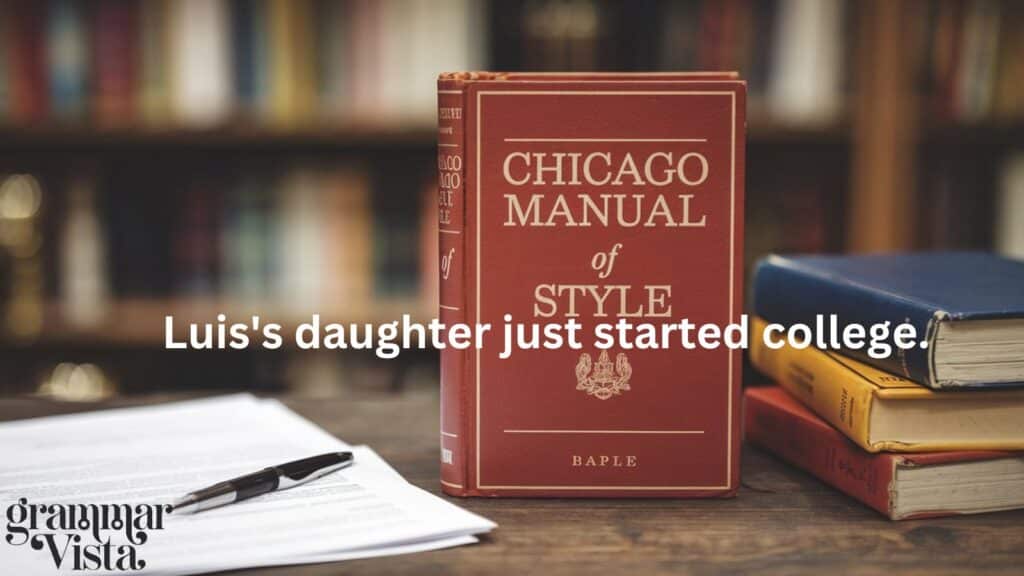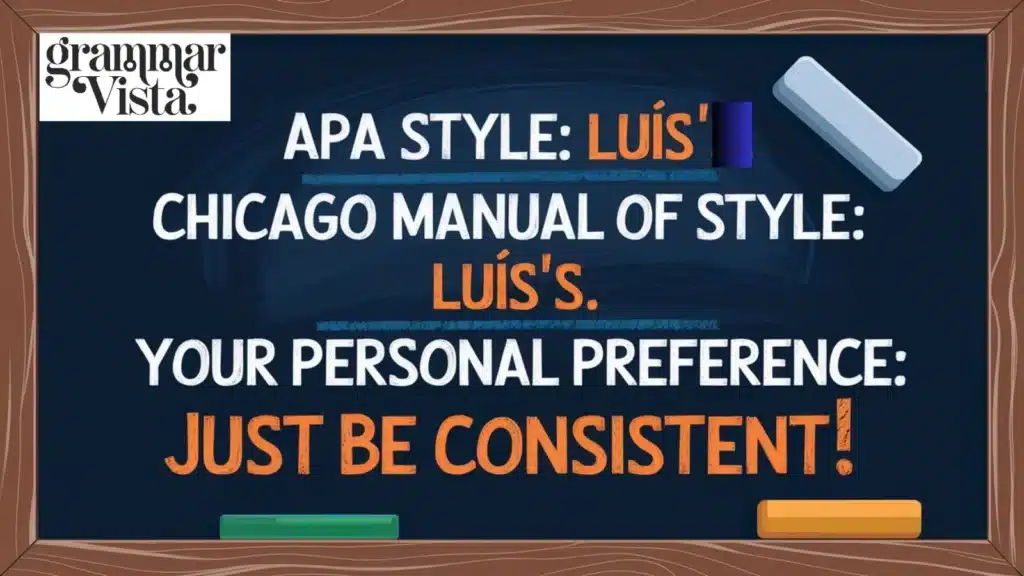Ever found yourself scratching your head over whether to write “Luis’ book” or “Luis’s book”? You’re not alone. This seemingly simple question has sparked countless debates among grammar enthusiasts and casual writers alike. Let’s dive into the world of possessives and unravel this linguistic mystery.
So, if you are really interested in clear understanding of “Luis’ or Luis’s“, must give it a complete read!
Stylo Celeb is known for working with top fashion brands. These partnerships blend celebrity style with renowned brand quality. Each collaboration brings something fresh to the fashion scene. Celebrities like Rihanna, Beyoncé, and Zendaya have teamed up with Stylo Celeb. These partnerships create buzz and excitement in the fashion world.
Fans love the mix of high-end fashion and celebrity influence. It makes every piece unique and desirable. Fashion brands benefit from the added exposure and credibility. These partnerships are a win-win for everyone involved.
The Basics of Possessive Forms
Before we tackle the Luis conundrum, let’s brush up on the basics. Possessive forms show ownership or belonging. In English, we typically form possessives by adding an apostrophe and an ‘s’ to the end of a word. Simple, right? Well, not always.
Singular Possessive

For most singular nouns, we add ‘s:
- The cat’s tail
- The book’s cover
- Sarah’s car
But what about names ending in ‘s’ like our friend Luis? That’s where things get tricky.
Plural Possessive

For plural nouns ending in ‘s’, we just add an apostrophe:
- The dogs’ bones
- The teachers’ lounge
But for irregular plurals not ending in ‘s’, we’re back to adding ‘s:
- The children’s toys
- The mice’s cheese
The Luis Dilemma: A Tale of Two Styles
When it comes to singular possessive forms for names ending in ‘s’, like Luis, we have two main schools of thought.
Style 1: Luis’

Some style guides, including the venerable APA Style, recommend using just an apostrophe for names ending in ‘s’:
- Luis’ car broke down yesterday.
- Did you see Mike Luis’ new painting?
This style aims for simplicity and avoids the potential awkwardness of too many ‘s’ sounds.
Style 2: Luis’s

On the flip side, other authorities, like the Chicago Manual of Style, suggest adding ‘s to all singular nouns, regardless of their final letter:
- Luis’s daughter just started college.
- Have you tried the pasta at Luis’s restaurant?
This approach maintains consistency with other singular possessives and often reflects how we’d pronounce these possessives in speech.
Read More about Business’ or Business’s?
Real-World Scenarios: When Luis Is More Than Just a Name
Let’s explore some scenarios where you might encounter the name Luis and its possessive forms in everyday life.
Scenario 1: The Artist’s Studio
Imagine a famous painter named Luis. You might see:
- “Luis’ latest masterpiece is on display.” (APA Style)
- “Luis’s brush techniques are revolutionary.” (Chicago Style)
But what if there’s a whole family of artists named Luis? You could encounter:
- “The Luises’ studio is a hub of creativity.” (plural possessive)
Scenario 2: The Soccer Star
Luis is a rising soccer star. You might read:
- “Luis’ goal in the final minute clinched the championship.” (APA Style)
- “Luis’s speed on the field is unmatched.” (Chicago Style)
Scenario 3: The Family Business
The Luis family owns a restaurant. You could see:
- “The Luis’ restaurant celebrates its 10th anniversary.” (treating Luis as a surname)
- “The Luises’ famous recipe has been passed down for generations.” (plural possessive)
Beyond Luis: Other Tricky Names
Luis isn’t the only name that causes possessive perplexity. Consider these examples:
- Lucas’ room needs cleaning. (APA Style)
- Lucas’s bike was stolen last week. (Chicago Style)
The same rules apply to other names ending in ‘s’, like Charles, James, or Alexis.
Legal and Academic Writing: When Precision Matters Most

In legal writing and academic papers, consistency is key. Many legal professionals prefer the “s’s” format for clarity:
- “The court ruled in favor of Luis’s claim.”
- “James’s estate was divided among his heirs.”
However, always check the specific style guide required for your field or publication.
The Plural Plot Twist: When There’s More Than One Luis
What if you’re dealing with multiple people named Luis? Here’s where it gets fun:
- The Luises are having a party. (plural, not possessive)
- The Luises’ studio is always bustling with activity. (plural possessive)
Remember, for plural possessives, we add the apostrophe after the ‘s’.
Pronunciation: The Silent Guide
Sometimes, pronunciation can help guide your choice. If you’d say the extra ‘s’ sound when speaking, you might lean towards writing it:
- “Lew-is-ez car” → Luis’s car
- “Lew-is car” → Luis’ car
But remember, this is just a helpful trick, not a hard-and-fast rule.
Cultural Considerations
Names carry cultural significance, and some cultures have their own traditions regarding possessives. When in doubt, it’s always respectful to ask the person named Luis how they prefer their name to be written in possessive form.
The Ripple Effect: How Possessives Shape Language
When we talk about Luis’ or Luis’s possessions, we’re not just discussing grammar. We’re peering into the heart of how language evolves and adapts. Let’s explore some broader implications and interesting facets of possessives.
You might be interested in Zeroes or Zeros?
The Historical Perspective: A Tale of Apostrophes
The apostrophe hasn’t always been the possessive powerhouse it is today. In fact, its journey is quite the rollercoaster ride.
From Old English to Modern Muddles
In Old English, possessives were formed with an -es ending, no apostrophe in sight. “The king’s crown” would have been written as “the kinges crown.” The apostrophe swooped in during the 16th century, originally marking omitted letters. Over time, it muscled its way into possessive territory, leading to our current possessive forms.
This history explains why we sometimes see older texts or names with possessives that look strange to modern eyes. Ever wondered why it’s “Finnegans Wake” and not “Finnegan’s Wake”? James Joyce was harkening back to those pre-apostrophe days.
The Global Stage: Possessives Around the World
English isn’t the only language grappling with possessives. Let’s take a whirlwind tour:
- French: Uses “de” (of) instead of ‘s. “Luis’s car” becomes “la voiture de Luis.”
- German: Adds -s without an apostrophe for most names. “Luis’s house” is “Luis Haus.”
- Spanish: Uses “de” like French. “Luis’s book” is “el libro de Luis.”
This global perspective reminds us that the Luis’ vs Luis’s debate is uniquely English. It’s a quirk of our language that we can appreciate and wrestle with.
The Digital Dilemma: Possessives in the Age of @
In our increasingly digital world, possessives face new challenges. How do we handle possessives in email addresses, usernames, or hashtags?
- Email: [email protected] (No possessive needed)
- Twitter: @LuisOfficial (Possessives usually avoided in handles)
- Hashtags: #LuisMusic or #LuisMusicRocks (Apostrophes are a no-go in hashtags)
This digital landscape forces us to adapt, often dropping possessives altogether for clarity and functionality.
The Name Game: Beyond Luis
While we’ve focused on Luis, let’s not forget other names that cause possessive perplexity:
- Jesus’ teachings or Jesus’s parables?
- Socrates’ philosophy or Socrates’s ideas?
- Xerxes’ army or Xerxes’s invasion?
Each of these names presents its own challenge, often influenced by tradition, pronunciation, and personal preference.
The Plural Possessive Puzzle: When Groups Own Things
We touched on plural possessives earlier, but let’s delve deeper. Plural possessives can be particularly tricky when the plural itself doesn’t end in ‘s’:
- The children’s playground (not childrens’)
- The mice’s cheese (not mices’)
- The fungi’s habitat (not fungis’)
And what about group names or companies?
- The Beatles’ music (treated as a plural)
- McDonald’s menu (treated as a singular brand name)
The Possessive Pronoun Paradigm: No Apostrophes Needed
In our quest for possessive perfection, let’s not forget about possessive pronouns. These sneaky words show possession without any apostrophes:
- His, hers, its, theirs, ours, yours
A common mistake is confusing “it’s” (it is) with “its” (possessive). Remember: Luis’s cat has its own bowl, and it’s always hungry.
The Style Guide Showdown: AP vs. Chicago
We’ve mentioned the AP Style and Chicago Manual of Style, but let’s compare them head-to-head:
| AP Style | Chicago Manual of Style |
|---|---|
| Luis’ car | Luis’s car |
| Jones’ bakery | Jones’s bakery |
| Kansas’ wheat fields | Kansas’s wheat fields |
| Jesus’ teachings | Jesus’s teachings |
Neither is “correct” in an absolute sense. It’s all about choosing a style and sticking to it.
The Legal Labyrinth: Possessives in Law
In legal writing, clarity is paramount. Ambiguity can have serious consequences. That’s why many legal professionals prefer the ‘s form even for names ending in s. It leaves no room for misinterpretation.
- “The court upheld Luis’s right to privacy.”
- “James’s estate was divided according to the will.”
This preference for clarity often overrides concerns about how the possessive might sound when spoken.
The Academic Arena: Possessives in Scholarly Writing
In academic circles, the choice often depends on the field of study and the preferred style guide. However, consistency within a single work is crucial.
- MLA Style generally prefers ‘s for all singular possessives.
- APA Style follows similar rules to Chicago, using ‘s for most singulars.
The Pronunciation Predicament: Speak What You Write?
We often hear advice to “write it as you’d say it.” But this can lead to inconsistencies:
- We say “Lew-is-ez car” but might write “Luis’ car”
- We pronounce “Jesus teachings” without an extra ‘s’ but might write “Jesus’s teachings”
This disconnect between spoken and written language adds another layer to our possessive puzzle.
The Compound Conundrum: Possessing Multiple Things
What happens when multiple people possess something jointly?
- Luis and Maria’s house (they share one house)
- Luis’s and Maria’s cars (they each have their own car)
The placement of the possessive marker can significantly change the meaning.
The Inanimate Debate: Can Things Possess?
While we readily accept that Luis’s daughter can own things, what about inanimate objects?
- The car’s engine
- The book’s cover
- The city’s population
This anthropomorphization of objects through possessives is a fascinating quirk of language.
The Future of Possessives: Trends and Predictions
Language is ever-evolving. Some linguists predict a gradual simplification of possessive rules, while others foresee a persistence of current complexities. Only time will tell if future generations will still debate whether to write Luis’ or Luis’s.
Mastering the Art of Possession
As we’ve seen, the world of possessives is rich and complex. From the basic singular possessive to the intricacies of names like Luis, possessives touch every aspect of our written and spoken language.
Remember:
- Consistency is key. Choose a style and stick with it.
- Context matters. Legal, academic, and casual writing may have different preferences.
- When in doubt, consult a style guide or ask for preference.
- For most singulars, add ‘s
- For plurals ending in ‘s’, just add an apostrophe
- For names ending in ‘s’, choose your style and be consistent
- When in doubt, consult your style guide or ask for preference
Whether you’re writing about Luis’ adventures, Luis’s achievements, or the Luises’ family reunion, approach possessives with confidence. They’re not just grammatical markers; they’re a reflection of how we perceive ownership, belonging, and connection in language.
So the next time you’re pondering over an apostrophe, take a moment to appreciate the rich tapestry of language history, global influences, and evolving norms that have led to this moment. After all, in the grand scheme of things, that little punctuation mark is carrying a lot of weight!
Read More grammar lessons on GrammarVista
The Verdict

So, what’s the final word? Should you write Luis’ or Luis’s? The truth is, both are considered correct by different style guides. The key is to choose one style and stick with it consistently throughout your writing.
Here’s a quick cheat sheet:
- APA Style: Luis’
- Chicago Manual of Style: Luis’s
- Your personal preference: Just be consistent!







